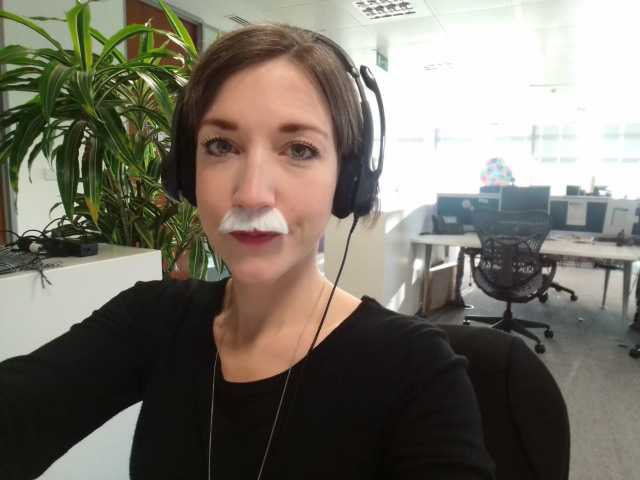2021-October-08
Did you know? You can share this story using the social media icons on the upper left. Use the hashtag #WeAreCisco. You can also rate or comment on the story below.
I Couldn’t Give Up
BY ESTHER TRIFICH · BUSINESS DEVELOPMENT MANAGER · AUSTRIA
WITH HELEN GALL
I can't remember a day when I wasn't in some form of pain — sometimes more, sometimes less, but it has been a constant companion throughout my life.

A not-so-carefree childhood
As a child, I frequently had ear infections and, from day one, struggled with digestive distress and constant tummy aches. As a teenager, my periods were so bad that I had to take painkillers and stay in bed for days. I was a regular at the orthopaedist, as I had crippling back pain. Puberty threw me into depressive mood swings. I never felt quite right or fully healthy.
In my 20s and early 30s, things got worse: I was in pain after most meals, was often diagnosed with oophoritis, added chronic neck pain and frequent joint pain to my repertoire, and I went through two long periods of depression.
I started to withdraw socially and felt lonely and isolated, which aggravated most of my conditions, especially my depression.
My own personal odyssey
This was also the start of my quest to find out what was wrong with me. In the beginning, I went to public health care providers. I quickly hit a dead end and had to start seeing private doctors and alternative therapists.
Nobody seemed to believe me when I suggested that it might be an autoimmune disease.
In 2016, I was diagnosed with cancer and had to undergo extensive surgery and treatment. The tumour was endocrine and triggered various hormonal issues. After that, the standard answer to any of my ailments was, “Well, that’s still due to the tumour.”

When talking to my doctors, I often felt misunderstood, ignored, even ridiculed at times. They completely dismissed any suggestion of an overarching, more complex illness.
I switched doctors more than I can remember. The marathon of appointments and tests left me exhausted and feeling hopeless. Often, I was too tired to work and had to call in sick. I did not dare talk about my struggles, as I was afraid of getting fired.
People around me kept asking if I was “finally” better if they had “finally” figured out what was wrong with me. The pressure of this just added to my emotional stress, and I eventually stopped talking about it. Many nights I was up crying for hours, not sure how life would go on.
A step in the right direction
Recommendations from people with similar symptoms and stories finally led me to a great set of specialists, and, slowly, the diagnoses started to trickle in: Irritable bowel syndrome (IBS), lipoedema, fibromyalgia, and endometriosis.
I have started treatments, medication, and diets, but I have yet to see real improvement. Still, the fact that I now have doctors I trust and who take me seriously is worth everything to me.
Taking it day by day
After an accident limited my mobility last year, I had to accept yet another new state of normal: Needing more time to get ready, for housework, for basic tasks. Making more time for slower forms of exercise, regular physical therapy. And scheduling breaks throughout my workday.
It continues to be a daily struggle. It can be difficult to stay hopeful, which is why I got back in touch with my former therapist, who has been a huge help in getting me into a more positive mindset.
I also developed a fantastic set of little life hacks — born out of necessity, of course — to make my everyday life easier and do more on my own.
The problem with chronic illness
To me, the worst thing about chronic illness is how lonely it can be.

Many people don’t understand that it can take decades before you finally receive a diagnosis. Even then, you may never really “get better” and have to learn to manage and live with the illness and the pain as best as you can.
I still have awful days — a lot of them, in fact. But I know that giving up is not an option, and I also know that I have a support system on which I can rely.
That doesn’t stop me from still lying on the floor crying at times, but it gives me hope and pushes me to pull myself up again. And again. And again. For as long as it will take.
You are not alone
I am grateful Cisco helps bring mental health and well-being into the spotlight by raising awareness, breaking down stigmas, providing resources and training, and enabling open conversations.
I’m also incredibly lucky to have two great leaders, Elisabeth De Dobbeleer and Fred Farges, who are committed to investing in this topic every day.
Being able to talk about your mental health is the first and crucial step. To anyone out there struggling, please know: You are not alone, you only need to reach out.
Many support options are available, from doctors and therapists to community health centres and local support groups.
There are great resources from Cisco, such as the Mental Health First Aiders. I happen to be one of them, and I invite anyone struggling to reach out to me personally. I’d be happy to talk to you.
You May Also Like…
- For Paula Silveira Temple, unexpected life turns and the difficulties of being a new mom triggered postpartum depression.
- Aylan Shelton describes her experience with body-focused repetitive behaviors and realizing she wasn’t alone.
- What Megahan Richardson wants everyone to know about suicide prevention after her personal experience.
- Liz Helyer shares how she found answers, support and strength along her mental health journey.
- David Salter shares how it’s ok not to be ok, and no matter what he goes through, his team always has his back.
Connect everything. Innovate everywhere. Benefit everyone.
Share your thoughts!
Log in to rate and commentShare your thoughts on the story here!